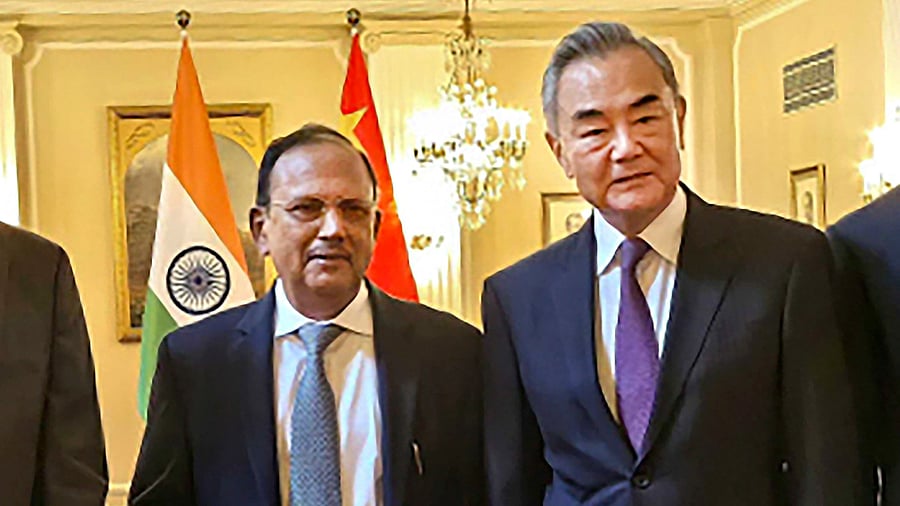
File Photo of Ajit Doval with Chinese Foreign Minister Wang Yi
Credit: PTI Photo
New Delhi: India has reaffirmed that Taiwan is a part of China, Beijing has claimed, as National Security Advisor Ajit Doval hosted the neighbouring communist country’s foreign minister, Wang Yi, in New Delhi for boundary negotiations on Tuesday.
Doval and Wang, the special representatives of India and China for boundary negotiations, held the 24th round of meeting a day after External Affairs Minister S Jaishankar had a meeting with his counterpart from Beijing. A press release issued by the Ministry of Foreign Affairs of the government of China quoted Jaishankar as saying during the meeting with Wang that maintaining a stable, cooperative, and forward-looking relationship would serve the interests of both countries. It also quoted the external affairs minister telling his counterpart that India considered Taiwan to be a part of China.
A source in New Delhi, however, said that India had not shifted from its stand on Taiwan. Jaishankar told Wang that India, like the rest of the world, had a relationship with Taiwan that focused on economic, cultural and technological ties, added the source.
New Delhi had earlier reaffirmed its 'One-China' policy in its joint statements with Beijing. But it stopped doing so after 2008, in response to China’s policy of issuing ‘stapled visas’ to the residents of Jammu and Kashmir, Ladakh and Arunachal Pradesh, instead of normal visas pasted on passports issued by the Government of India. China used the ‘stapled visas’ to assert its claims over territories of India.
Prime Minister Narendra Modi’s government, however, had in July 2018 indirectly reaffirmed its adherence to the 'One-China policy' and made Air India change 'Taiwan' with 'Chinese Taipei' in the list of destinations on its website. Taiwan had strongly reacted, stating that the move by Air India could be seen as India “succumbing to the unreasonable and absurd pressure" from China.
The One-China policy recognises only the People's Republic of China, which came into existence in 1949 after the communists defeated the nationalists in the civil war of China. It does not recognise the existence of Taiwan (or the Republic of China), where the nationalists retreated to and based the seat of their government after losing to the communists.
India, like most other nations, has been adhering to the One-China policy since 1949, recognising only the People's Republic of China. That is why India and Taiwan do not have formal diplomatic and consular missions in their respective countries.
The India-Taipei Association, which is headed by a diplomat, functions as New Delhi’s de facto diplomatic and consular mission of India in the capital of Taiwan. The Taipei Economic and Cultural Centre (TECC) in New Delhi similarly serves as the de facto diplomatic and consular mission of Taiwan, officially the Republic of China (RoC), in the capital of India. A TECC was also set up in Chennai in 2012.
Taiwan is keen to expand its quasi-diplomatic presence in India, where many of its technology companies want to set up manufacturing bases in the wake of its escalating tension with China. A new TECC was set up in Mumbai in 2024 despite protests from Beijing.
Beijing had also lodged a protest with New Delhi in June 2024 after Modi responded to a message from Taiwan’s President Lai Ching-te, who had congratulated him for leading the National Democratic Alliance to victory in the parliamentary elections in India.
China’s April-May 2020 move to unilaterally change the status quo along its disputed boundary with India in eastern Ladakh and the consequent four-and-a-half-year-long military stand-off between the two sides had triggered calls to the Modi government to review its policy on Taiwan to send out a message to the communist country. The government, however, did not make any such move.
Jaishankar reaffirmed New Delhi’s stand on Taiwan being a part of China amid attempts by India and its communist neighbour to bring back on track the bilateral relations, which had hit a new low during the stand-off in eastern Ladakh.
